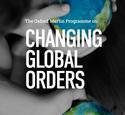Andrew Hurrell and Louise Fawcett on Global Orders at the ISA
Co-Directors Profs. Louise Fawcett and Andrew Hurrell will be speaking on global orders at the 2025 International Studies Association annual convention in Chicago.
The Programme includes:
March 1st 2025 | Andrew Hurrell | Roundtable discussant | Liberalism beyond the West
In recent years, IR scholars have made significant strides in illuminating the crucial role that liberal political entrepreneurs from beyond the West have played in shaping the international norms and institutions that uphold the global order. This research has examined diverse phenomena, including the global spread of self-determination, the norm of non-intervention, the creation of the United Nations and the Bretton Woods institutions, the evolution of human rights law, the non-proliferation regime, and the neoliberal revolution. This roundtable debates the historical, theoretical, and normative dimensions of tracking the role of non-Western liberals and liberalism in the making of world order. Historically, it will highlight the promise of scholarship that traces the transnational connections between the West and the rest in the development of liberal norms and institutions. Theoretically, it will explore alternative approaches to making sense of the role of non-Western liberals and liberalisms in the creation of international order. Normatively, the discussion will examine the potential for reimagining a "liberal international" capable of countering contemporary illiberal challenges. By tackling these three dimensions at once, the roundtable aims to take stock of what we know and identify potentially rich avenues for future research.
March 3rd 2025 | Louise Fawcett | Roundtable Chair/Participant | Reconnecting 'the Other' Regions and Powers: Populating a 'Global' View
International Relations – in theory and practice – are, by definition, diverse, interdisciplinary and global. Yet, even with unprecedented globalization and diversification, much IR discourse falls short. First, IR debates about global order and crises leave out perspectives, empirics, history and concepts or theories from parts of the world beyond the United States and Europe. Second, the IR literature is thin on studies that compare across world regions outside of North America and Europe. To help populate aspirations of globality in IR, this Roundtable features scholars of the IR of Africa, Asia, and Latin America to reconnect across the geographical boundaries of the so-called ‘Global South’. They address themes including the organisation of power and authority in each region; the relationship between regional and global security challenges; and how these regions shape and respond to ongoing changes in global order and IR theory. This Roundtable respectfully and thoughtfully engages in a comparative dialogue and examines empirical evidence from these regions to better understand what assumptions, research questions, and theories (if any) could be globally generalizable, and what might be regionally (or selectively trans-regionally) bounded. It explores how knowledge about these understudied regions advance and enrich knowledge of international and global affairs.
March 4th 2025 | Andrew Hurrell (Chair) | Panel | From Latin America to the World: Shaping Law and Diplomacy
Over the past decade, scholars have highlighted Latin America's significant yet often overlooked contributions to international norms, institutions, and practices. These innovations span multiple areas, including shaping sovereignty and territorial norms, pioneering human rights, advocating for universal participation in multilateral forums, and influencing international law and organizational designs, among many others. Moving beyond this “inventory” of Latin American contributions, this panel explores the mechanisms that enabled Latin American actors to exercise global agency. Individual papers examine pathways of influence from the regional to the global level in law and diplomacy, paying attention to both successful and failed examples of diffusion.
The papers in this panel include:
Louise Fawcett |'Shocking changes? Latin America and global order'
'Global’ International Relations, with its commitment to unsettling dominant narratives of international order and its origins, demands that we listen to other voices (Tickner 2003) and register their contributions to ensure a truly plural discipline. But the listening process remains highly selective, particularly among those who insist on the hierarchy of Western orders. From the independence period to the present, it is clear that Latin American states and actors have regularly impacted upon development of international society in different ways – in debates around international law, institution building and economic development, for example. Yet the exact causes and extent of their influence remains underspecified. This paper proposes that different inflexion points, such as ‘shocks’ or major periods of turbulence in international history, have provided singular opportunities for Latin American (and other states) to actively influence global ordering processes in meaningful ways. It seeks to explore under which conditions, global, regional, and local, Latin American actors have been able to make a difference, and with which consequences.




